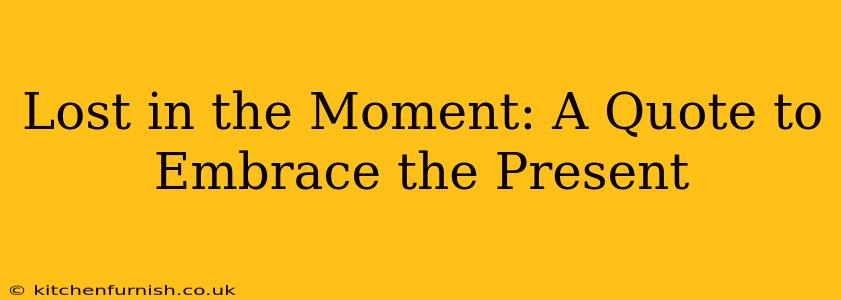"Lost in the moment" – a phrase that evokes a sense of blissful absorption, a state where time seems to melt away and we are fully present in the here and now. This isn't just a fleeting feeling; it's a powerful state of mind that can profoundly impact our well-being and happiness. This exploration dives into the meaning behind this evocative phrase, exploring its significance and offering practical ways to cultivate a more present-minded existence.
What Does "Lost in the Moment" Really Mean?
At its core, "lost in the moment" describes a state of complete immersion in an activity. It's the feeling of being so engrossed in what you're doing that all other thoughts and worries fade into the background. This isn't about escaping reality; it's about fully engaging with it. When we're lost in the moment, we're not passively observing; we're actively participating, utilizing our senses, and connecting with the experience on a deeper level. This deep engagement often leads to increased focus, creativity, and a sense of flow.
How Does Being "Lost in the Moment" Benefit Us?
The benefits of embracing the present moment are numerous and well-documented. Scientific studies have shown that mindfulness practices, which encourage being present, can reduce stress, anxiety, and even improve physical health. When we're lost in the moment, we're less likely to be consumed by rumination on the past or anxieties about the future. This allows us to experience a sense of peace, contentment, and joy derived from the simple act of being.
What are the key benefits of mindfulness and presence?
Mindfulness, the practice of being present, offers a wealth of benefits. It reduces stress by focusing your attention on the present, rather than dwelling on past mistakes or worrying about future uncertainties. This, in turn, improves sleep quality, as a calm mind is more readily able to drift off. Beyond stress reduction, mindfulness enhances focus and concentration, allowing for greater productivity and creativity. The heightened awareness cultivates emotional regulation, making it easier to manage challenging feelings and respond thoughtfully rather than impulsively. Finally, studies have shown a correlation between regular mindfulness practice and improved physical health, including lower blood pressure and a strengthened immune system.
How can I learn to be more present?
Cultivating presence isn't about escaping life; it's about engaging with it more fully. Start by incorporating mindfulness practices into your daily routine. Simple techniques like deep breathing exercises, meditation, or even paying close attention to the sensations in your body during everyday activities can help. Engage your senses fully when eating, listening to music, or spending time in nature. Practice gratitude by consciously noticing and appreciating the good things in your life. The key is to dedicate time each day to cultivate this awareness and to intentionally shift your focus to the present moment.
How can I "get lost" in the moment more often?
Finding activities that naturally lead to a state of flow is key. This could be anything from engaging in a hobby like painting or playing music to immersing yourself in a captivating book or engaging in a physically demanding activity like hiking or running. The common thread is complete absorption in the activity itself, a shutting out of external distractions, and a sense of accomplishment in the process. Identify activities that spark this level of engagement and make a conscious effort to schedule them into your day.
What are some examples of being "lost in the moment"?
Experiencing "being lost in the moment" can manifest in numerous ways. For some, it's the feeling of complete absorption while painting, where the brushstrokes become intuitive and time seems to vanish. For others, it could be the meditative state of running, focusing on the rhythm of the breath and the pounding of feet. It might be the deep engagement with a captivating book, losing oneself entirely in the narrative. Even simpler activities, like enjoying a cup of tea with full awareness of its aroma and taste, can be profoundly present experiences. The crucial element is a focused attention and a suspension of judgment or preoccupation with anything outside the immediate experience.
Embrace the Power of Presence
"Lost in the moment" isn't just a catchy phrase; it's a description of a powerful and beneficial state of being. By cultivating mindfulness and actively seeking experiences that lead to immersion, we can unlock the transformative power of presence and enhance our overall well-being. The journey towards a more present life is a continuous process, but the rewards—increased joy, reduced stress, and a deeper connection with ourselves and the world around us—are immeasurable.

